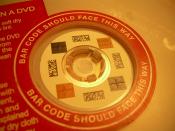Running Head: Coinstar Coinstar
Coinstar
A Review of Some Related Literature
Webster University
February 20, 2013
ABSTRACT
Coinstar, Inc. is an American company that was founded in 1991 and is headquartered in Bellevue, Washington. Redbox is an Automated Retail, LLC, and is a leading vendor of rental DVDs through automated kiosks. It is a wholly owned subsidiary of Coinstar, Inc. Redbox has kiosks active in more than 14,000 locations in North America; Redbox has served more than 40 million customers. Redbox continues to change the DVD rental industry with kiosks located in the nation's leading grocery stores, convenience stores, discount stores, and other locations nationwide.
Redbox got its start with the launch of its DVD rental kiosks in McDonald's locations in Denver, CO, Minneapolis, MN, and Houston, TX. Redbox needed a solution that was able to increase DVD capacity over existing machines as well as improve overall product functionality for kiosks located primarily at McDonald's restaurants.
Redbox who was faced with an advertising campaign deadline revamped their machines, which in the beginning included groceries. They realized that the DVD's were doing better than the food and revamped their machines to focus on this source only. Redbox specializes in the rental of DVDs, Blu-ray Discs, and video games via automated retail kiosks.
Some of the key people in the roles of Redbox are Anne Saunders, President of Redbox, J Mitch Lowe, former President, Gregg Kaplan, Founder and CEO of Redbox. After the merger the Coinstar / Redbox key people are founders Jens Molbak, and Dan Gerrity. Other key people are Paul Davis (CEO), and Gregg Kaplan (President and COO). These are the people that ensure that their product lines of Coin Services, Entertainment Services, E-Payment Services, and Self-Service DVD Kiosks turn a profit and stay ahead of competitors (http://www.en.wikipedia.org/wiki/Coinstar).
OVERVIEW
In 1989, a student called Jens began interviewing supermarket shoppers as part of a graduate school project. He learned that people had a lot of change at home and really don't care to go through the trouble of sorting, wrapping, and rolling those coins in order to take them to the bank.
Two years later, with his Stanford degree in hand, Jens founded Coinstar. Two classmates who shared his goal of creating an easy way for people to turn their accumulated coins into cash joined him. They got to work and eventually succeeded in creating a machine that could quickly count change while filtering out the nuts, bolts, paper clips, and other "dirt" that is often found in piggy banks and coin jars (www.dooyoo.co.uk/services-misc/coinstar) .
Coinstar needed to identify new and profitable locations for their coin conversion machines. They turned to SPSS Inc.'s data integration and analysis capabilities with various demographic and geography-based variables. Coinstar's decision-making process was limited to educated guesses based on demographic data used within its Geographic Information System (GIS). The GIS enables Coinstar to manipulate, analyze, and visualize geographic aspects of data, most frequently in the form of a map. However, due to the large number of variables involved and the depth of analysis required, Coinstar needed a more comprehensive statistical package to digest its large dataset. Although more than 400 key variables were available to Coinstar, the company analyzed and used only four variables, due to resources and the limitations involved in working with Microsoft Excel.
By combining SPSS Inc.'s data integration and analysis capabilities with various demographic and geography-based variables, Angelo Taylor, Coinstar's GIS research manager, and his market research colleagues were able to identify prospective installation locations with the best potential for growth and profitability (Reuters).
Coinstar's coin counting kiosks are the foundation for the company and steady revenue of income. The coin segment has fewer competitors than the DVD segment and holds five original patents for its coin counting technology. These kiosks offer customers a more convenient way to convert coins into cash for a small processing fee. Also, customers can convert coins into gift cards and avoid the processing fee. The success of Coinstar is influenced by its ability to apply new technologies into the counting of coins. Coinstar coin counting machine has the ability of counting coins at a rate of 600 coins per minute thus improving its efficiency for customers.
In comparison, Redbox which is Coinstar's DVD rental business faces many challenges. Redbox experiences seasonality in DVD rentals where revenues are higher during the holidays and summer months. Also, Redbox has more competitors than the coin segment which include Netflix, Apple TV, and Amazon.com. Redbox must continue to build strong relationships with movie studios. As a result, Redbox's dependence on these relationships is a major disadvantage for its new rental releases DVD's. Even though Coinstar's recent growth was generated by the Redbox DVD rental kiosk, the company faces a major obstacle. DVD's like every thing else will soon become a thing of the past due to video streaming applications over the internet. A sign of this is Blockbuster's bankruptcy which is an eye opener that the movie rental industry as a whole is declining and as we all have seen through pass trends, something always replaces something else with a claim that it is better (en.wikipedia.org/wiki/Coinstar).
FINANCIAL OVERVIEW
Coinstar is taking in to consideration the competition of other companies like Netflix, Amazon Prime and Hulu when it comes to the streaming market of video streaming. Even with the lack of revenue from video streaming Coinstar forecast earnings between 77 cents and 92 cents a share, on revenue between $568 million and $593 million for its first quarter. It's short of the $1.22 a share and $628.8 million in consensus sales estimates from analysts surveyed by FactSet for the quarter.
On the brighter side for the company, Redbox revenue for the fourth quarter grew 9.6% to $488.3 million. The service saw 188 million rentals during the quarter, up from 174.8 million rentals during the same period in 2011. Coinstar CEO Paul Davis seized upon that good news. "What gives us a lot of optimism is there are a lot of things to point to that will unfold over the course of the year," said Davis. "First is that Blu-ray as a percentage will continue to grow." Coinstar owns Redbox and Davis will retire on March 31st of this year. Coinstar's CFO, J. Scott Di Valerio, will assume the role of CEO. "We are uniquely positioned to take advantage of the increased acceptance of Blu-ray given our value price point and marketing assets, which we plan to further leverage to help consumers discover and explore the format," Davis said.
According to Home Media Magazine, Blu-ray accounted for 12.5% of Redbox revenue for the fourth quarter, nearly double its Blu-ray revenue from 2011. "The Avengers" and "The Amazing Spider-Man," "Dark Shadows" and "Brave" helped drive up those rentals. "After facing unique and very challenging market conditions in Q3, Redbox improved performance on the DVD business compared with the prior year, posted impressive growth in Blu-ray, and improved profitability in video games," Davis said.
Coinstar is aggressively expanding Redbox's capacity. Kiosks will increase disc capacity by more than 80 discs this year and new kiosks and "a significant percentage" of existing kiosks will be upgraded in 2013, according to the report. Redbox had 8,300 new kiosks installed in 2012 and now as a total of 42,400. Coinstar expects to install 1,000 new Redbox kiosks in the U.S. in 2013. The company also cemented a new agreement with Warner Bros. that came into effect at the beginning of the year. The kiosk will get rights to Warner's Blu-Ray and DVD titles 28 days after retail release.
Revenue for the fourth quarter of 2012 increased 8.4% to $564.1 million compared with the fourth quarter of 2011, driven primarily by Redbox revenue growth of 9.6% to $488.3 million primarily reflecting new kiosk installations. Coin revenue remained relatively flat at $74.5 million. Operating income for the fourth quarter of 2012 was $47.8 million, which resulted in an operating margin of 8.5%, compared with operating income of $54.7 million and an operating margin of 10.5% in the fourth quarter of 2011. The decrease in operating margin was primarily driven by the operating results from the kiosks acquired as part of our NCR asset acquisition.
Income from continuing operations for the fourth quarter of 2012 was $22.9 million, or diluted earnings per share from continuing operations of $0.75, a decrease in diluted earnings per share of 25.0% compared with $31.5 million, or $1.00 per share, in the fourth quarter of 2011. Core diluted earnings per share from continuing operations for the fourth quarter of 2012 was $0.93, excluding non-core adjustments of $0.18 per share, compared with $1.03, excluding non-core adjustments of $0.03 per share in the fourth quarter of 2011. Coinstar's fourth quarter 2012 results include a negative impact of $6.4 million before taxes, or $0.13 on core diluted earnings per share from continuing operations attributable to the operating results of the kiosks acquired as part of the NCR asset acquisition.
For the 2012 full year revenue was $2.2 billion, an increase of 19.3% compared with 2011. Operating income for 2012 was $262.8 million, which resulted in an operating margin of 11.9%, compared with operating income of $209.9 million and an operating margin of 11.4% in 2011. Income from continuing operations for 2012 was $150.2 million, or $4.67 per diluted share, compared with income from continuing operations of $115.0 million, or $3.61 per diluted share, in 2011, an increase in diluted earnings per share of 29.4%. Core diluted earnings per share from continuing operations for the full year 2012 was $4.83, excluding non-core adjustments of $0.16 per share, compared with $3.67 per diluted share, excluding non-core adjustments of $0.06 per share in 2011.
For the full year, results include a negative impact of $14.5 million before taxes, or $0.28 on core diluted earnings per share from continuing operations attributable to the operating results of the kiosks acquired as part of the NCR asset acquisition. Net cash flows from operating activities from continuing operations in the fourth quarter of 2012 was $152.2 million, compared with $144.9 million in the fourth quarter of 2011. Cash paid for capital expenditures for continuing operations for the fourth quarter of 2012 was $74.9 million, compared with $44.5 million in the fourth quarter of 2011. Free cash flow from continuing operations for the fourth quarter of 2012 was $77.3 million, compared with $100.4 million in the fourth quarter of 2011, bringing the total to $255.9 million for the full year of 2012.
During the fourth quarter of 2012, the company repurchased approximately $76.7 million of its common stock representing 1.57 million shares at an average price of $48.71 per share. Of the total amount repurchased, $75.0 million was completed through an accelerated share repurchase agreement entered into on November 1 and concluded on December 28, 2012 and the remaining $1.7 million was completed through open market repurchases. During 2012, the company repurchased approximately $139.7 million of its common stock representing 2.80 million shares at an average price of $49.92 per share through a combination of a previously announced 10b5-1 plan, accelerated share repurchase agreements, and open market purchases. On December 31, 2012, there was $133.6 million remaining under the current Board authorization for stock repurchases. In January 2013, Coinstar's board authorized the repurchase of an additional $250 million, plus the amount of cash proceeds received by the company from the exercise of stock options by its officers, directors and employees (http://finance.yahoo.com/news/coinstar-inc-announces-2012-fourth).
CONCLUSION
Coinstar for now is the leading entity in the DVD rental business so it is likely that the company will outperform the market and look to keep expanding their control of the market, even though the market is in decline. This makes Coinstar a good buy for at least for a few more years as they dominate DVD rentals. But looking ahead Coinstar might be a good play if they are able to make their streaming service profitable and continue to expand their business models.
References
Coinstar: http://www.en.wikipedia.org/wiki/Coinstar
Reuters: Coinstar Inc (CSTR.O) Company Profile;
http://www.reuters.com/finance/stocks/companyProfile
http://www.dooyoo.co.uk/services-misc/coinstar
Coinstar down despite Redbox dominance of DVD rentals
http://www.bizjournals.com/profiles/company/.../Coinstar.
Coinstar Inc, CSTR: NSQ company performance; http://www.markets.ft.com/research/Markets/Tearsheets/Forecasts


